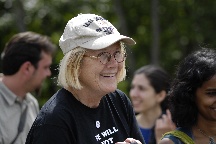
Former U.S. diplomat and peace activist Ann Wright was turned away twice from Canada in 2007. Photo by Christina Riley
Medea Benjamin and Ann Wright
[Jun 11, 2008 03:42 PM]
Well-known U.S. peace activists Ann Wright and Medea Benjamin were denied entry to Canada on October 22, 2007 because their names were on an FBI crime database meant to track potential terrorists, fugitives and violent criminals.
They were told they couldn't enter Canada until they were "rehabilitated." Undeterred Ann Wright again attempted to enter Canada a couple of days later when she was invited to speak on Parliament Hill about the use FBI databases by Canadian border officials. This time immigration officials at the Ottawa airport told her she was barred from entering Canada for one year.
Seven months later, the two women, along with other well-known anti-war activists were allowed short visits to Canada to speak at a peace conference and to witness the House of Commons non-binding vote to permit U.S. war resisters to remain in the country.
"I hope this signals a change of policy by the Canadian government," said Ms. Wright, a retired U.S. Army colonel who resigned as a senior diplomat at the U.S. Embassy in Mongolia in 2003 in protest against the war in Iraq.
"We hope so, as we pose no threat to Canadian security and indeed our actions in the United States for which we were arrested seem to reflect the views of most Canadians that the war in Iraq should end."
Ms. Wright and Medea Benjamin, co-founder of Code Pink, a women's peace group and founding director of Global Exchange entered Canada at the Blaine border crossing on June 1, 2008 to attend a peace conference in Vancouver. They were escorted by New Democratic MP Libby Davies who had driven to the U.S. side to meet them.
"I personally vouched for them when they were stopped by the Canada Border Services Agency (CBSA), said Ms. Davies, adding that officials probably didn't want to make a big scene, especially as a local television news crew was standing by.
Ms. Davies questions the arbitrariness of the whole process. Why were Medea and Ann singled out and questioned for almost three hours, while Diane Wilson, another well-know U.S. peace activist with a string of arrests, wasn't even stopped when she entered Canada that same day?
And why wonders Ms. Wright, was she denied entry two previous times? CBSA officials showed her a two-sheet printout that had three convictions: one for unlawful assembly at the White House on International Women's Day 2002; one for speaking out during a congressional hearing in 2003; and one for trespassing when a group tried to deliver 152,000 anti-war signatures to the U.S. Mission to the UN in March 2005. She was also questioned about her arrests, all of which were minor misdemeanours - the equivalent of parking tickets - for which she had paid fines. "It's not like any of these are felonies," said Ms. Wright. "These are all peaceful, non-violent protests."
"It is outrageous that the FBI is placing peace activists on an international criminal database - a blatant political intimidation of U.S. citizens opposed to Bush administration policies. But it is also outrageous that the CBSA is using this FBI database to determine who can enter the country," said Ms. Benjamin.
Meanwhile on June 2, 2008, Veterans for Peace (VFP) national president Elliot Adams and VFP member Will Cover drove from New York to Ottawa to observe the House of Commons vote on the resolution to allow U.S. war resisters to stay in Canada.
After being asked at the border crossing if either had ever been arrested, they both acknowledged that they had been arrested for protesting Bush policies on the war in Iraq. They were further questioned in secondary screening, and after two hours allowed to continue into Canada.
Tell your story
- Do you suspect that your name is on a no-fly list or another government watch list?
- Are you always stopped, searched and interrogated when you attempt to cross the border although you’ve never been charged or convicted of any crime?
- Do you believe you have been mistakenly or unfairly targeted?
- Do you suspect ethnic or religious profiling?
- Do you no longer travel for fear of being singled out?
We want to hear from you, please contact us.
